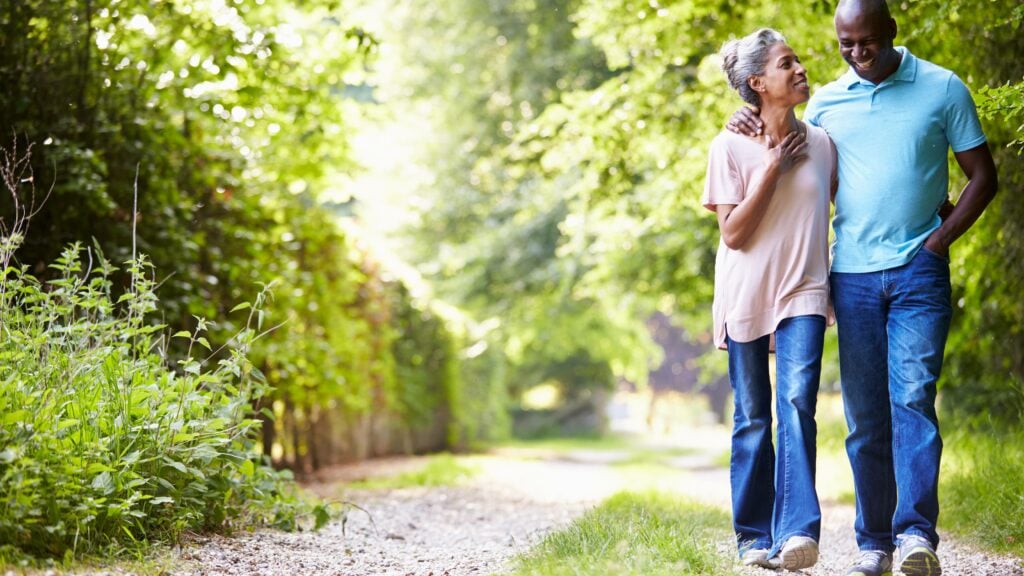
Walking: how to take your first steps to a healthy new habit
Phillipa Cherryson
Experts share their tips for keeping active and healthy if you’re observing Ramadan in 2024.
Ramadan is a time of fasting from sunrise to sunset – but also a period of self-reflection, charity, prayer and good deeds. In 2024 it started on the evening of Sunday 10th March and will end on Tuesday 9th April. But can you still exercise to keep healthy during this holy month?
The answer to this is yes and we’ve got the best advice from the experts on how you can keep active and healthy.
Ramadan is a time of fasting from sunrise to sunset – but also a period of self-reflection, charity, prayer and good deeds. In 2024 it started on the evening of Sunday 10th March and will end on Tuesday 9th April. But can you still exercise to keep healthy during this holy month?
The answer to this is yes and we’ve got the best advice from the experts on how you can keep active and healthy.
 Credit: Shutterstock/Odua Images
Credit: Shutterstock/Odua ImagesWe spoke to mountaineer and marathon runner Haroon Mota. He is the founder of the walking community Muslim Hikers and last year ran the Boston Marathon in four hours 30 minutes during Ramadan.
He told us: “Carry on exercising during Ramadan, but be sensible. The most important message is to listen to your body and learn what it can do in the circumstances.”
Mohsin Hussain, from Puregym Birmingham, says: “Between fasting, spending time with family and prayers, it can be difficult to have the time and energy to exercise during Ramadan.
“Physiologically speaking, the best time to train would be during your eating window between sunset and sunrise. This is when your body will be refuelled from Iftar, and you’ll be able to drink water, as well as refuel after.
“However, it may not always be possible to train during this time as this is when you would normally be asleep.
 Credit: Puregym Birmingham
Credit: Puregym Birmingham“Training an hour or so before Iftar is also a good option, as it means you can drink water and eat once you’ve finished working out. You’ll be hungry and dehydrated at this point, so step back the intensity – now is not the time for high-intensity cardio sessions or trying to get a personal best.”
Exercising on an empty stomach can lead to a dip in blood sugar levels which can cause light-headedness. It can also be easy to get dehydrated if you exercise during fasting.
Dr Ayazullah Safi is a lecturer in the Department of Public Health at Birmingham City University.
Dr Safi says: “Walking is the easiest form of exercise to fit in to your day because we do it all the time. You can increase the benefits of walking by trying brisk or ‘power walking’, which requires all of your muscles to dynamically move and help you achieve optimal fitness.
“Remember that you will not have the same amount of energy when you are fasting. Avoid high-intensity exercises like sprinting or lifting heavy weights.
“You can still improve your stamina and fitness with more gentle cardiovascular activity. Try brisk walks around the park, cycling or jogging, but keep workouts short – 30 to 60 minutes is plenty.”
 Credit: Dr Ayazullah Safi
Credit: Dr Ayazullah SafiDrinking enough fluids is vital if you are balancing keeping active with fasting. Drink at least 8-12 glasses of fluid (about two litres) daily between Iftar and Sahoor.
Avoid drinks with caffeine, as it is a diuretic and could make you more dehydrated.
When you are fasting between 11-18 hours a day, depending on what time of year Ramadan falls in, you need to choose nutrient-rich food to keep your energy levels up and avoid losing weight.
Dr Saffir says: “Some of the things you need to avoid are salt, caffeine, sugars and processed foods.
“It is equally vital to consume a meal that includes a good balance of starchy carbohydrates, such as potatoes, rice and bread, along with a good intake of vegetables, proteins such as meat, chicken or fish, and dairy for the natural fats.
“Remember that there is only a small window to provide your body with all the key nutrients that the body needs, so the focus of your diet needs to be on quality.”

Written by Phillipa Cherryson she/her
Published: Updated:
Phillipa Cherryson is a senior digital editor for Saga Exceptional. Phillipa has been a journalist for 30 years, writing for local and national newspapers, UK magazines and reporting onscreen for ITV. In her spare time she loves the outdoors and is a trainee mountain leader and Ordnance Survey Champion.

Phillipa Cherryson

Gemma Harris

Ruth Tierney

Becky Fuller